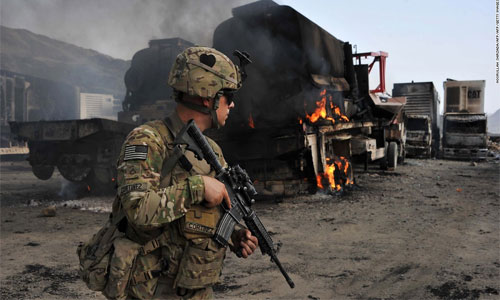The sixth round of peace talks between the U.S. and Taliban representatives in Doha ended late on Thursday but the prospect of peace is still ambiguous and violence has intensified in many parts of the country in recent days. There is no doubt about the fact that majority of Afghans want peace, but there is no consensus on which mechanism can lead to peace. One of the most important and complicating reasons of war in Afghanistan is its multivariate feature. The main variables in Afghan conflict are opium trade, inter-religious identity, ethnic nationalism, proxy war and the expansionist policies of the neighboring countries; each of these factors is highly effective in Afghanistan’s conflict and peace. This article aims to analyze each of these variables separately.
The first variable in the Afghan conflict are opium trade; since 80s of the twentieth century, Afghanistan has been one of the most prominent drug producers (opium) in the world. Opium has actively entered in the political economy of the country and even the region, which is most beneficial to gang groups, terrorists, corrupt government officials and, last but least, to the farmers of the country. Today, drug trafficking is one of the most important commercial goods in the world; despite being illegal it has a huge profit. Over the past years, millions of dollars have been spent on countering drugs, but the result was not favorable.
The Afghanistan’s opium is exported to Europe, North America and Russia through neighboring countries, and those who are in the final chain of this trade are gaining its major part of profits. After the opium collected by the farmers, it is passed into local traffickers and then with the help of corrupt government officials, including the police and other security agencies, transferred to the borders and neighboring countries with millions of dollars exchanged. The Corrupt officials as well as insurgents and terrorists equally benefit from this trade, and so those who have access to the opium trade in Afghanistan will never be willing to work for peace and rule of law, because establishing the rule of law will cut off their black revenues.
The second variable in the Afghanistan conflict is confrontation of Inter-Religious Identity and Ethnic Nationalism. Forty years ago, when the Soviet Union invaded Afghanistan, the political Islam, especially religious extremists were used as an effective instrument in the cold war. The religious fundamentalism intensified the inter-religious-civilizations gaps and the most important of which could be consist of al-Qaeda, the Taliban and ISIS, which seriously endangered international security. Extreme Interpretation of religion, especially political Islam, provokes the jurisprudence differences that had occurred in the 4th to the 6th Islamic centuries in the Muslim world. As the culture of tolerance and pluralism has not been institutionalized in Afghan society, the differences in view lead to divisions and insistences on a single religious interpretation.
During the years of war and violence in Afghanistan, some countries tried to expand their influence, and one of the tools they possessed was religion which spent millions of dollars on building new religious seminaries with expanding the activities of past seminaries these way the religious gaps have been aggravated in Afghanistan. During the US-Soviet war in Afghanistan, Saudi Arabia created thousands of religious schools in tribal areas of Pakistan and the border of Afghanistan that later graduates of these schools joined the al-Qaeda, Taliban and ISIL groups.
The engagement of government in daily conflict has also reduced the chances to supervise the religious training centers, especially the territories which are outside the control of the Afghan government. They continue their training activities with very backward and deviating materials and this way they pave the way for the continuation of the cycle of violence and wars in Afghanistan. In terms of political values, the demand for republic or Islamic Emirate is rooted in the religious view of the kind of political system in the country. Those who are in the favor of democratic system, argue that democracy has produced good results in many parts of the world but the inflexible interpretation from religion lead to religious tyranny which has already been experienced in Afghanistan and other countries. The Emirate system favorers in Afghanistan are those who do not believe in democracy, human rights, freedom are merely reliant on violence, and they believe in the theory of overcoming which is rooted in some historic religious interpretations.
Those who think about inter-civilization clashes, they are also in favor of Emirate system, but in a different form. In recent years, especially since the advent of the Taliban’s terrorist group in Afghanistan, the ethnic nationalism has also added to the challenges and in many instances, ethnic identity has become more prominent in religious affiliation. Those who profit from the friction within the civilization will not be willing to give up violence.The next factor is proxy war and the expansionist policy of neighboring countries; because of its geopolitical location Afghanistan has always been used as passageway or buffer state. During the Cold War, the Soviet invasion in Afghanistan caused that America seriously support Afghan insurgents and Arab jihadis in Afghanistan. Today, the battles in Afghanistan have provided the ground for the expansionist engagement of its neighbors and some world powers.
Now, in the most optimistic way, Afghanistan’s neighbors are striving to establish a political system that is obedient and not hostile to them. For the neighbors of Afghanistan, it is not important which kind of political system should come, the emirates or the republic, but they are trying to bring people to power to pursue their policies in Afghanistan.
Home » Opinion » What are the Main Factors of War in Afghanistan?
What are the Main Factors of War in Afghanistan?
| Salim Naji ; Translated by: Moh Zahir Akbari

